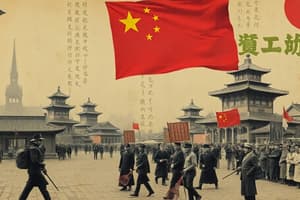Podcast
Questions and Answers
What economic stance did China maintain towards foreigners before the Boxer Rebellion?
What economic stance did China maintain towards foreigners before the Boxer Rebellion?
- They actively sought foreign investment.
- They encouraged the importation of foreign goods.
- They believed they had little to gain from foreigners. (correct)
- They relied heavily on foreign trade.
What was a major consequence of the First Opium War for China?
What was a major consequence of the First Opium War for China?
- China became fully independent of foreign influence.
- China lost and was forced to sign a treaty with Britain. (correct)
- China gained control over Hong Kong.
- China successfully banned opium trade.
Which event highlighted the weaknesses in the Chinese government during the 19th century?
Which event highlighted the weaknesses in the Chinese government during the 19th century?
- The Sino-Japanese War.
- The First Opium War.
- The Second Opium War.
- The Taiping Rebellion. (correct)
Which treaty legalized the importation of opium into China?
Which treaty legalized the importation of opium into China?
What was the primary reason for China's defeat in the First Sino-Japanese War?
What was the primary reason for China's defeat in the First Sino-Japanese War?
Flashcards
Chinese restricted trade policy
Chinese restricted trade policy
The Chinese government's deliberate attempt to limit foreign trade, driven by a belief in their cultural superiority and self-sufficiency. This policy, however, backfired, leading to conflicts and ultimately forced trade liberalization.
Opium
Opium
A highly addictive drug imported by Britain into China, fueling a trade that ultimately led to a series of conflicts known as the Opium Wars.
China's loss of control
China's loss of control
The Chinese government's inability to adequately address the growing power and influence of foreign nations within its borders, which led to political instability and a weakening of authority.
Taiping Rebellion
Taiping Rebellion
Signup and view all the flashcards
Open Door Policy
Open Door Policy
Signup and view all the flashcards
Study Notes
Boxer Rebellion - Background
- China viewed itself as superior due to its long-standing civilization, believing it had little need to interact with foreigners.
- Its economy, based on agriculture and craftsmanship, was well-organized but inflexible.
- Attempts to restrict Asian trade with other countries were unsuccessful.
- A significant potential for new markets and resources existed, but Europeans were prevented from accessing them.
- Britain became China's largest trading partner, primarily for tea, silk, and porcelain.
Opium Wars
- In the late 18th century, Britain began importing large amounts of opium into China.
- China's attempts to ban opium were largely unsuccessful due to its highly addictive nature.
- The Opium Wars (1839-1842, 1856) resulted in China's defeat, granting Britain control of Hong Kong and preferred trading status.
- The Treaty of Tianjin (1860) legalized opium importation and opened more ports to foreign trade.
State of China
- Foreign nations aggressively entered China, building infrastructure, ignoring local laws, and influencing politics.
- The Taiping Rebellion (1850-1864), a devastating civil war, resulted in an estimated 20 million deaths due to fighting, executions, famine, and disease. This highlighted the weakness of the Chinese government.
- The rebellion was suppressed with the help of British and French forces, exacerbating foreign influence.
Sino-Japanese War
- China's issues worsened leading up to the Sino-Japanese War (1894).
- Disputes over the Korean Peninsula escalated the conflict.
- China was severely defeated due to a poorly organized military, outdated weapons and equipment.
- The Treaty of Shimonoseki (1895) forced China to cede Korea, Formosa (Taiwan) and its military port, Port Arthur.
Open Door Policy
- Increased European and Japanese involvement in China, prompted US interest.
- The US negotiated an "open door policy" with other imperial powers to ensure equal access to Chinese trade.
- China was not a participant in these negotiations.
Studying That Suits You
Use AI to generate personalized quizzes and flashcards to suit your learning preferences.




